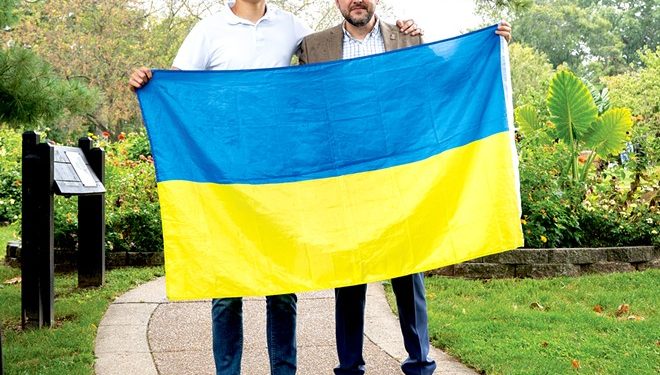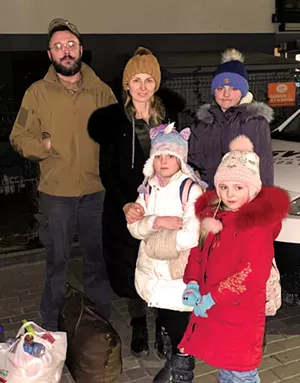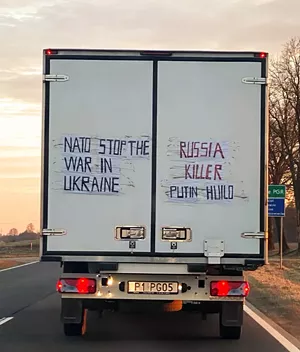Chase Wilhelm thinks of Ignat Striletskyi’s journey, which brought the 18-year-old from Ukraine to Springfield shortly after the Russian invasion in February, as a piece of fabric that a higher power must have helped create.
“It’s a mystery of God,” said Wilhelm, 38, a Montgomery County resident, state worker and ordained Disciples of Christ minister.
“We have to be careful when we say that God has a plan,” he said. “But you can’t tease it out of the cloth of Ignat’s story – that interweaving of fortune, of faith, of luck, along with the interweaving of dedication and hard work.”
Using his connections and experience as a U.S. Army veteran in Special Operations, Wilhelm single-handedly drove Striletskyi, the young man’s mother and 19 additional Ukrainian refugees to other European countries during the chaotic period immediately after the Russian invasion began Feb. 24.
Wilhelm helped Striletskyi (pronounced “stri-LET-skee”), who had been studying law at a top university in Kharkiv near Ukraine’s northeastern border with Russia, deal with bureaucratic hurdles to travel to Springfield this summer.
Striletskyi now is a freshman political science major at University of Illinois Springfield on a student visa, enjoying his studies and working out as a walk-on, 6-foot 4-inch goalkeeper for the UIS soccer team.
He is following the progress of the war with concern and fervor, even as Russian President Vladimir Putin threatens to use nuclear weapons and institutes a draft to bolster the ranks of his troops.
Striletskyi said he is confident Ukraine will prevail. He looks forward to when he can return to help his country rebuild.
Photo courtesy of Chase Wilhelm.
From left, Chase Wilhelm, Ignat Striletskyi and Ignat’s mother, Olena Striletska, are pictured after Wilhelm completed a five-hour drive from the Ukrainian border with Poland in March to drop off the mother-son pair in the Polish capital of Warsaw. The pair later made their way to Germany and eventually to France, where Striletska now lives with her 87-year-old father. Striletskyi now lives in Springfield.
“Russia has no chances,” he said. “You see how our country is united and how we protect our homeland.”
Striletskyi saw the damage that artillery fire inflicted on his university in Kharkiv, the country’s second-largest city with 1.4 million people. He knows of two fellow students who were killed by the Russians as they fled.
He ran with family members into shelters when his hometown of Dnipro in central Ukraine, population 933,000, was bombed in the days after the invasion began. He huddled with his mother on a crowded train with crying women and children and few belongings as the Ukrainian refugees headed toward the western border with Poland.
And he was surprised when he and his mother, Olena Striletska, 54, met Wilhelm in mid-March in a Polish village called Dorohusk where the pair hoped to arrange for transportation to the Polish capital. Lots of Poles and everyday people from throughout Europe – but no other Americans – were offering free food, clothing and rides.
“When I saw his American passport, it was amazing, because you never see a guy from America who will come to Poland to help you come to Warsaw,” Striletskyi told Illinois Times in fluent English with a thick accent.
Striletskyi’s mother, in a recent online interview from a friend’s home in France where she is living with her ailing 87-year-old father, said she considered her first meeting with Wilhelm a sign from God.
“He’s a really great person who really wants to help us,” Striletska said.
Wilhelm wasn’t connected with a relief organization when he was in Ukraine, but his military experience and his faith journey informed his decision to embark with confidence on what could be a dangerous mission.
Photo courtesy of Chase Wilhelm.
Chase Wilhelm, at left, drove this Ukrainian single mother and her three daughters to Warsaw, Poland, where they were photographed after the family fled Ukraine in March, a few weeks after the Feb. 24 invasion of Ukraine by Russian troops. The family eventually reached Norway, where the woman and her daughters live today in an apartment provided by the Norwegian government.
Wilhelm holds a master’s degree in divinity from Eden Theological Seminary in St. Louis, and a Ph.D. in ethics from Garrett-Evangelical Theological School at Northwestern University. He currently works as the chief of chaplains for the Illinois Department of Corrections and ran as a Democrat in an unsuccessful bid to unseat state Rep. Avery Bourne, R-Morrisonville, in 2020.
Wilhelm has served in the Army for 16 years, 10 years of it full time, and he is now a part-time member of the Army Reserves.
He served as a full-time administrator in charge of the spiritual branch of a Special Operations unit at a military base in Tampa, Florida, and also served in Special Operations – working alongside others in the Army as well as the Marines, Navy and Air Force – in Afghanistan and Eastern Europe. He spent time with members of the Polish Armed Forces, in particular.
Wilhelm said his desire to help the Ukrainians was rooted in frustration over his inability to leave Springfield and help his fellow American service members during the collapse of the Afghan government and the capture of Kabul by the Taliban in August 2021.
“I watched Afghanistan fall, and I wasn’t able to be there with my boys,” he said. When Ukraine was invaded, he thought, “I’m not going to let Ukraine fall without having done something.”
But first, he had to ask permission from his wife, Dr. Lyndsey Heise, an infectious-diseases specialist at Springfield Clinic who was eight months’ pregnant with their first child and lives in Springfield.
“She and I sat down and argued and cried, and she looked at me and she knew,” Wilhelm said. “She said, ‘If you go, you have to go now, and I know you’ll never be complete if you don’t.'”
Recalling the newlyweds’ conversation in the living room of their Springfield home, Heise said, “I didn’t think it was a great idea.” But after being with Wilhelm for 10 years and herself serving as a part-time soldier in the Illinois National Guard, she didn’t want to stop him.
“When he gets his mind made up about something, it’s hard to change it,” Heise said.
Added Wilhelm: “When you pray, you have to move your feet. This was a huge life decision point for me. Am I going to stay home and watch this happen, or am I going to be able to fall asleep at night with my own conscience?”
At about the same time in Ukraine, more than 5,400 miles away, Striletskyi was in his dormitory room in Kharkiv, a freshman at National University Yaroslav the Wise Law Academy of Ukraine.
Ukrainian students begin their study of law their first year of college and complete their training after about five years. Most Ukrainian students in high school are taught basic English, but few seek additional instruction, as Striletskyi did, to become fluent. He said he did so because he wants to work in government or become a politician in his country. That skill would help pave his way to America.
Striletskyi said he woke up about 5 a.m. Feb. 24 to the sound of artillery explosions in Kharkiv. The university was hit, he said, but he and the classmates in his dormitory weren’t injured. He was able to leave with two classmates that day when his mother drove with a friend from Dnipro, and they endured an hours-long traffic jam on the way back. He remembered seeing Ukrainian tanks headed into Kharkiv as he was headed out.
Striletskyi is from a middle-class family. His father died from heart problems when he was 10. After his father’s death, his mother began working his father’s soap and shampoo distribution business and also operated a small boutique.
“I’m really grateful for my mother,” Striletskyi said. “She has really struggled.”
After a few weeks of fleeing for cover when Russian bombs rained down on Dnipro and other Ukrainian cities, Striletskyi’s family decided that Striletskyi and his mother should be the first ones to get out of Ukraine until the conflict was resolved.
Those staying behind included Striletskyi’s older brother, uncle and grandfather.
“It was a really hard decision, but I said yes,” Striletskyi said.
With hopes of reaching her mother’s friends in Lithuania or France, the pair got on a train crowded with babies and adults, and many people crying. They were on a train with people from Mariupol, a southern Ukraine port city currently occupied by Russia.
Trains carrying refugees would stop between one and 10 miles from the Polish border, where passengers would get off and walk the rest of the way and go through entry control points.
By the time Striletskyi and his mother disembarked, Wilhelm had taken time off his state job, spent his own money to fly from Chicago to Warsaw, Poland, and used his funds and connections with the Polish military and Polish citizens to acquire a 1991 Fiat station wagon.
He said he made his way to the Poland-Ukraine border – a 332-mile stretch about the distance from Rockford to Carbondale – where he would use what little Polish he knew to offer free rides to desperate refugees before nonprofits such as the International Committee of the Red Cross had time to set up operations. It was something that lay people in Poland and throughout Europe were doing to help hundreds of thousands of Ukrainian refugees find food, clothing, shelter, bathing facilities and transportation.
“The vast response of the Polish people was an effort that met the humanitarian crisis in a way that I don’t think people will ever truly know,” Wilhelm said. “The everyday citizens came through in a very neat way.”
He met Striletskyi and his mother in one of the Polish villages near the border and offered to drive them the five hours to Warsaw. They didn’t talk about Springfield, and Wilhelm didn’t make any promises to the then-17-year-old.
Through family connections, the young man and his mother later made their way to sparse living quarters in Germany and finally in France, where her father remains.
Some other family members managed to leave Ukraine later, while others remain.
Wilhelm ended up shuttling a total of 21 people to cities in Poland and Germany, taking advantage of a part of Europe known as the “Schengen Area,” the world’s largest visa-free zone.
“I was driving as fast as I could for as long as I could and fitting as many people in that vehicle as I could,” Wilhelm said. He would sleep in the car on the side of roads on a mission he said cost thousands of dollars of his own funds but gave him satisfaction.
He said he logged more than 124 hours behind the wheel in the week he was in the region.
“My goal was to get as many people as I possibly could to safety,” he said. “I do not advise any American citizen to do what I did,” Wilhelm said. “It can often end up doing more harm than good if you’re not very careful. You have to be prepared to ask yourself, ‘Why are you going?’ Are you going to fill some need in your heart? Is this all about you? Or do you bring a skill, an asset, a resource, a knowledge base to the table that can be used? Are you willing to be just a cog in a wheel?”
After Wilhelm returned to Springfield, Striletskyi, with whom he kept in contact on social media, made a request of Wilhelm: Could he look into Striletskyi coming to the United States to continue his education at UIS?
That was after universities in Germany, Spain and France turned him down because he wasn’t fluent in their languages. The university Striletskyi attended in Ukraine remains closed.
Wilhelm agreed. “I knew he had a heart to continue and pursue his education,” Wilhelm said.
The highly bureaucratic process – filled with frustrations and delays because original high school and college transcripts weren’t available amid the chaos in Ukraine – ended with Striletskyi arriving in Springfield in July.
Striletskyi’s mother said she misses her son terribly but is proud of him. They talk every day on a video link on the WhatsApp messaging system.
She said she is “so glad” that her son is “in great hands.”
Striletskyi speaks with Wilhelm by phone most days and spends time with Wilhelm’s family on the weekends. Wilhelm’s wife, parents and other relatives treat him like one of the family.
“I kid them like I’m a second baby of Chase,” Striletskyi said.
Messages of opposition to the Russian invasion of Ukraine are on display in this photo of the back of a semi-trailer truck that Montgomery County resident Chase Wilhelm saw in Poland in March as he drove Ukrainian refugees to safety in a Fiat station wagon.
Wilhelm was able to return to Springfield in time for the birth of his daughter, Margaret, on May 9.
He said he has been able to raise about $8,000 from friends and family for many of the 21 refugees he drove to safety. He sent one woman, a single mother with three daughters who was able to relocate to Norway, about $2,000 to pay for a microwave oven, school clothes and notebooks for the woman’s children.
Striletskyi’s initial education expenses have been covered by funds from his family, Wilhelm’s family, other donations and a UIS scholarship. But most other costs for the school year need to be covered, and Wilhelm is seeking online donations for that purpose at bit.ly/UISStudent.
Striletskyi continues to apply for scholarships, and he hopes to eventually compete on the soccer team if bureaucratic hurdles related to his Ukrainian transcripts can be resolved to the satisfaction of the National Collegiate Athletic Association.
He said he doesn’t know whether he will eventually pursue a law degree in the United States or Ukraine. It all depends on the outcome of the war, he said.
Since arriving in Springfield, he has shaken hands with Gov. JB Pritzker, whose ancestors are from Ukraine. He has displayed the Ukrainian flag near the Lincoln statue at the Capitol. And he has set up a booth to educate his UIS classmates about Ukrainian history.
Despite daily headlines coming out of his country, some of them disturbing, Striletskyi said he remains upbeat about his future.
He said he feels both fortunate and deserving of good fortune after all the hard work he put in to learn English, improve his English and continue to pursue his dreams. And he is grateful for the kindness of the Wilhelm family.
“They really care about me,” he said. “It’s incredible. It’s really cool. You really feel that you are not alone here in the United States.”
Dean Olsen is a senior staff writer for Illinois Times. He can be reached at [email protected], 217-679-7810 or twitter.com/DeanOlsenIT.
Source by www.illinoistimes.com

















































